Author Archives: Tereza Ma
Holly Springs school celebrates 70th anniversary with alumni, friends, students
By Laura Grisham
HOLLY SPRINGS – This year, St. Mary’s/CADET/Holy Family School celebrates 70 wonderful years of education.
During Labor Day weekend, several hundred alumni and educators gathered to celebrate. No doubt it was also a grand undertaking for those on the reunion committee, and in particular, chairman Vincent Smith (Class of 1981).
Two years after World War II ended, Sacred Heart Father Paul Frichtl, bought an old abandoned school building in Holly Springs and began to make enough repairs to make the building usable. In 1948, the St. Mary School for African American children opened.
The following year, four School Sisters of St. Francis arrived to work with him. When St. Mary’s began, eighth grade was the highest level offered. Another grade was added each year until all 12 grades were available. In 1954, the first seniors were graduated from St. Mary’s High School.
In 1969, St. Mary’s merged with St. Joseph’s to form C.A.D.E.T. (Christian Aided Development Through Extraordinary Training). CADET Child Care Center opened in 1974 with 25 children and CADET High School closed. A new computer lab was installed for students in 1995, and with that, CADET changed its name to Holy Family School in order to provide a stronger Catholic identity.
“Seven decades have brought about many changes in our world and in our schools, but the commitment of Sacred Heart Southern Missions (SHSM) and the Priests of the Sacred Heart to educating hearts and minds remains steadfast,” said Fr. Jack Kurps, SCJ, executive director of SHSM.

Above, a pep squad of current Holy Family Students cheered on those attending the reunion during a Friday night meet-and-greet. At right, Sr. Cathy Mauge, OSF, and Cathedral Pryor Wilkins at the picnic on Sunday.
“Our school has been and remains a sanctuary for children, where they are safe and receive guidance, discipline and love. Our students receive a quality education — a firm foundation not only in academics, but also in Christian values and respect for one another.”
Friday evening, guests were treated to a meet and greet, complete with tasty food and jazzy entertainment. The Holy Family Pep Squad greeted alumni with cheers and acrobatics to begin the evening. Beta Club members offered tours of the building.
The next day alumni volunteers cleaned out the school’s basement. Much to the delight of current Principal Clara Isom, two dump trailers of trash were removed. Equally hard work was being performed upstairs as members of the reunion committee set up and decorated for the banquet scheduled for later in the evening.
Nearly 200 former students, teachers and principals attended the gala Saturday night. The evening began, as does every event, with a prayer. Several alumni addressed the gathering, sharing fond memories.
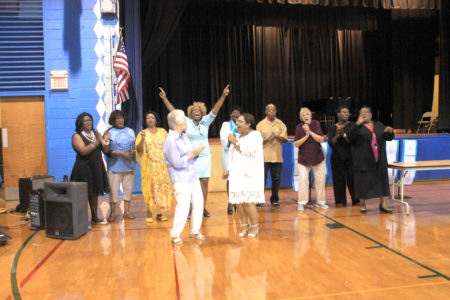
HOLLY SPRINGS –The reunion chior had the crowd on its feet singing ‘Oh Happy Day’ at a Sunday morning worship service to celebrate Holy Family School’s 70th anniversary during the Labor Day weekend. (Photos by Laura Grisham)
Former Cadet principal, Sister Sheila Kloss, OSF, was the guest speaker for the night. Traveling all the way from California for the event with another former CADET educator, Sister Cathy Mauge, OSF. She greeted attendees with heartfelt enthusiasm. Citing the gospel, “’Lord, it is good for us to be here. This is a sacred place.’ All of us and many others over the years made this a sacred place by coming together to live, to learn, to love.”
Sunday began in earnest with a rousing worship service. Prayers, scripture and hymns filled every corner of the school gymnasium. The Reunion Choir and Rev. Catherine Robinson Willett had everyone on their feet with “Oh Happy Day.”
Services ended prior to noon, giving those in attendance just enough time to don their blue reunion t-shirts and some comfortable shoes before attending a closing picnic.
(A longer version of this story appeared in the Sacred Heart Southern Missions newsletter.)
Ospino hears from pastors, lay community
By Berta Mexidor
PEARL – In an analysis of history and its consequences on today, Dr. Hosffman Ospino exchanged information with priests, seminarians, sisters and lay people who work in the parishes of the diocese during two intensive gatherings. Ospino, assistant professor of theology and religious education at Boston College’s School of Theology and Ministry, was in Jackson for Faith Formation Day August 25, so the office of Hispanic Ministry invited him to meet with pastors and lay people separately at St. Jude Parish.
Ospino presented several facts about the development of Catholicism in the United States to both groups centered on why in the 21st century the church is adopting ministries designed to alleviate segregation in the parishes. This segregation, once imposed socially and legally, is now self-inflicted.
The current segregation, he said, is a personal attitude to choose segregated life and it is a trend that has been getting worse since the 1960s. “This self-segregation is destroying us,” Ospino noted. Personal experiences and culture are taken to church every Sunday, this can affect the church positively or negatively.
Catholics have struggled to keep and share their faith for centuries. At the beginning, Irish, Germans and Italians created national churches to keep their faith, language and customs.
Blacks, Latinos, Asians and other internationals are converging in Catholicism from different routes and causes. Specifically, for Latinos, in every country, Catholicism has been the main religion, a heritage from the colonization of Spain and Portugal. In terms of major migrations of Spanish speakers to the U.S., one important event was when generations of Mexicans, became U.S. citizens after the Guadalupe Hidalgo Treaty on 1848. Later, in the 1960s, political and economic instability detonated a migration from Latin American and Caribbean countries, bringing Catholicism with it. Mexicans, Cubans and Puerto Ricans came to be part of established Catholic churches in U.S. This pattern continues until today with the immigration of Venezuelans, Guatemalans, Hondurans and more.
These immigrants share the same language – Spanish, but their children speak English. “Hispanic Ministry needs to use both languages, or even ‘Spanglish’ if necessary, to share the gospel to all,” Ospino joked.
Embracing diversity is the new challenge for Catholic churches. Bringing the best of different societies and cultures will strengthen the Catholic Church. “Latinos are attending church, everywhere they go, to keep their faith” Ospino emphasized, remarking that at the end all “Catholics are called to share and keep their faith.”
Priests, deacons and leaders from more than 20 parishes came to the first gathering. Most of the priests are working in places were the Latino community has an important presence in Mississippi. At the second meeting, Saturday afternoon, more than 70 Latino parishioners shared their hopes and challenges with Ospino. He noted Hispanics have a history in United States with deep roots, and based in that foundation, Latino families need to continue the construction of their identity. This time one of the participants highlighted the fact that parents should have an active participation in school system to support their children’s education, therefore they need to learn English, and understand the American system.
Ospino called their attention to certain figures: in United States’ 196 archdioceses/dioceses with more than 17 thousand churches, 35 million Latinos are Catholics. Two-thirds of Hispanics live in poverty; only 18 percent have a college degree. The average age of Latinos is 19 years, which represents almost 60 percent of the entire Latino population.
These statistics should impel the Catholic Church to first – reach out to the Hispanic youth, second – work with family life and third– create a new context for vocations. Coincidentally, these are the objectives of the main agenda for the V Encuentro, which will be held at the end of September.
The numbers grow every year and “this human tsunami is transforming the Catholic Church,” creating what Ospino considers to be “multicultural churches.”
Padre Capó visits V Encuentro delegates
By Sister Maria Elena Mendez, MGSpS
JACKSON – Father Rafael Capó, director of the Pastoral Institute of the Southeast (SEPI), visited on Sep. 5, the Diocese of Jackson’s delegates to the V Encuentro to be held at the end of the month. In this preparatory meeting, Father Capó reminded delegates that they are the representatives of all Mississippi Latinos. He encouraged the team to be prepared intellectually, but also spiritually, studying the documents and assuming the whole task.
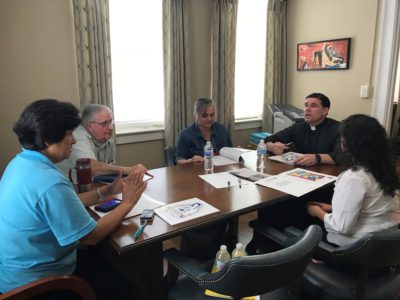
Sister Maria Elena Mendez, Brother Ted Dausch, Danna Johnson, Father Rafael Capó, and Mazy Ismar meet to prepare for V Encuentro.
Father Capó explained delegates are not going to participate just in another conference, the V Encuentro is a conclave to work by order of the U.S. Bishops. Despite the small size of the delegation, it showcases the diversity of the community in Mississippi carrying their challenges and hopes.
“You are sent, first by the bishop, but this is also like links in a chain,” Father Capó said, referring to the fact the four delegates also belong to the southeastern regional delegation. The V Encuentro will be held in Grapevine, Texas, from September 20-23. “The V Encuentro is, according to the Pope, a moment of grace” Father Capó concluded.
(Sister Maria Elena Mendez is a coordinator for Hispanic Ministry for the
Diocese of Jackson.)
Accompany young people – invigorate the church
By Maureen Smith
MADISON – Both keynote speakers at Fall Faith Formation Day had a message for catechists and pastoral leaders: the key to keeping the church in Mississippi vibrant is in empowering young people. Hosffman Ospino, a professor and expert in Hispanic ministry and Robert Feduccia, a national leader in youth ministry bookended a day of information, fellowship and encouragement for more than 200 catechists from across the diocese on Saturday, Aug. 25. The overarching theme for the event, organized by the Office of Faith Formation and hosted at Madison St. Joseph School, was ‘One, Holy, Catholic and Apostolic.’
Ospino spoke in the morning, offering a history lesson about the church and immigration. He showed how the Church in America was once concentrated in the Northeast thanks to European immigrant families who came and built their cultural churches and schools to serve their communities. Today, the numbers are shifting. The church in the South and West is growing thanks to a different immigrant community, Latinos from Central and South America. Another key statistic: the age difference between these populations. Non-Hispanic, white church members have an average age of 55. Hispanics make up 43 percent of the population with an average age of 28. Youth and young adult ministry are needed to keep these young Catholics in the church.
He said the Diocese of Jackson is in a unique position because existing communities can welcome their new neighbors. “In a sense being small and having been exposed to racial diversity and more recently linguistic diversity with the arrival of Latinos and Catholics who speak other languages, is an opportunity to test ideas. Being a mission diocese as well gives you all the flexibility in the world to imagine ‘what does it mean to be an evangelizing community,’” said Ospino.
He encouraged catechists and pastors to learn some Spanish or identify a member of the Hispanic community who can interpret for them so both communities can better communicate. “It is not two Churches that are merging, it is one and the same church. It is one and the same people of God called from many places and we are called to build the church here, period. We have different journeys different ways of doing things, different languages, cultural traditions, but we are in this together,” he said.
The day closed with a talk from Robert Feduccia. The Brookhaven native has fond memories of Catholic School and parish faith formation in his hometown. He has founded a program for evangelizing teens and has dedicated his life to helping people connect to a younger population. He also spoke about the immigrant population, but warned that they should not be taken for granted.
First generation immigrants, he explained, do practice their faith with their families “… yet the longer they are here their patterns being to resemble what we are already experiencing (with teens who leave the church) so if we are not proactive then even though there is this great invigoration that’s happening from the immigrant church, they will not bring long-lasting vigor any more than the Irish or Italians or anybody else brought long-lasting vigor. There has to be some real intentionality on formation- as Pope Francis says on the ‘encounter and accompaniment’ of us with our young people regardless of ethnic background,” he said.
Between these two speakers, attendees could select from a number of breakout sessions dealing with catechetical issues such as RCIA, adult faith formation, self-care for ministers and how to use the new VIRTUS curriculum for safe environment training. Terri Collins from Jackson Holy Family attended the VIRTUS session. She said she is thrilled with the new lessons and resources. She wants to find ways to share this important information with the whole parish, not just the students and their families. “The biggest question mark for me was what can we do to educate the entire parish so everyone is looking at it (safe environment) now only when we are in the church but also when we leave and are at the mall or when our kids are going to practice and all these other things,” she said. A group of more than a dozen young adults came from Pontotoc St. Christopher to attend the day. Jorge Gonzàles said he was glad to meet other Catholics from around the state and felt challenged to do more for his parish. “I like the Surprise and Joy session (by Feduccia) because it mainly applied to the youth. I learned that the youth start to lose faith around the age of 10; this is why we need to help the youth with their faith,” he said.
New St. Gabriel Mercy Center director ready to serve close to home
By Denise Strub
MOUND BAYOU – If Dr. Shakebra L. Young had a mantra for her life it might be ‘God has a plan,’ as some of the biggest moves and successes in her life were not part of her original plan. Young is the new executive director of St. Gabriel Mercy Center, Inc. in Mound Bayou.
“God led me here to this place. I am blessed to be here and work with well-educated, cross-trained women. I’m pleased to have this opportunity to lead and give back and serve,” she said. Young is the first African-American woman to hold the position of executive director at St. Gabriel Mercy Center.
“I’m very excited to be back,” said Young, who is a native of Cleveland. She is the daughter of Mary Young and Karry Hilley and the mother of two daughters, Bry’Kevia and Jusilynn. She is a 1996 graduate of East Side High School. After high school she earned a Bachelor of Business Administration Degree in Computer Information Systems and Office Administration from Delta State, where she became a member of Delta Sigma Theta Sorority, Inc.
In May 2009, she obtained a Master of Science Degree in Clinical Social Work from The University of Tennessee and shortly afterwards, she enrolled into the doctoral program at Capella University. In May 2012, she earned a Doctor of Philosophy Degree in Human Services and later obtained a Graduate Certificate in Non-Profit Management from Walden University. She is still an online instructor for Walden. She is currently pursuing a Masters of Business Administration Degree in Human Resource Management from Delta State University. “Delta State is right there. I had to take advantage of it,” she said.
Young said she is devoted to helping others through outreach ministry with a strong passion for youth and single parent families. “I want to make a difference especially with families. I want to help build strong families,” said Young. In July 2014, Young published a memoir, titled, A Single Mother’s Journey from Suffering to Glory: My Testament of Faith. This book enables the reader to witness one woman’s hardships and how life-changing events propelled her to live a life of trust, perseverance and faith. Young has also worked in various positions and settings in the social work profession as an educator, therapist and mentor. Young served as an instructor in the Department of Social Work at The University of Mississippi and an adjunct professor of social work at The University of Memphis.
She worked as the director of programs at Sacred Heart Southern Missions – a faith-based organization located in northern Mississippi. “I’m very grateful for everything I learned at Scared Heart,” said Young, who added though she is not Catholic, she is familiar with the Catholic atmosphere and looks forward to working within the entire community. St. Gabriel Mercy Center started as a parish and school. It now operates as a community center, offering several programs, including St. Gabriel’s Closet, The Delta Boutique, GED, Learning Lab, Senior Outreach, Parents As Teachers and Emergency Assistance. The Sisters of Mercy and the Fanciscan Sisters of Christian Charity have provided leadership in the past.
(Story reprinted with permission from Bolivar Commercial.)
Marian Consecration
PEARL – Participants in the St. Louis De Montfort consecration to Jesus through Mary made their consecration at St. Jude’s Church at the close of the Vigil Mass for the Feast of the Assumption of Mary. This group is a part of The Marian Servants of Jesus, the Lamb of God. The nine participants journeyed together through the 33-day preparation during weekly meetings. Each week participants prayed for a particular theme and grace from scripture and assigned readings. At the meetings they were given an opportunity to share the fruits of their prayers and received a teaching on the theme and grace for the coming week.
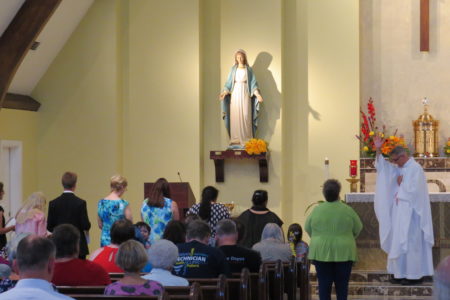
(Photo by Rhonda Bowden)
The Marian Servants is a lay association of the Catholic Church. The group has a special devotion to Mary and a focus on the spiritual works of mercy.
Teresa Preuss is the director of the local group along with and assistant director, Maureen Roberts. The mission of The Marian Servants is “to live faithfully our call to holiness and bring Catholic Christians to a deeper understanding of their vocation and mission in Christ, the Church and the world.”
For more information on the group, contact Preuss or Roberts by email at tepreussmahecha@gmail.com or mmjroberts@gmail.com.
Vocations born in young adult group
By Chris Spear
GULFPORT – When Clare Bush and Mike Addis celebrated their wedding Mass on July 28, they were the latest in a remarkably long line of couples to find each other through the Small Faith Communities program at St. Richard Church.
The program, still going strong at the Jackson parish 26 years after its start, has helped generate at least five marriages and ten children in the last decade – and shows no sign of slowing.
In 1992, St. Richard started its Small Faith Communities (SFCs), small groups that meet regularly during the week to pray, discuss a particular faith topic or question, and generally support each other in spiritual growth. In a minority-Catholic area like Jackson (and much of Mississippi), these group meetings are often the only times outside of Mass that parishioners might have to share their faith with other Catholics.
“They’re designed to help you to connect your faith to your everyday life,” said Nancy McGhee, St. Richard’s retired Director of the SFCs. “Scripture-reading and theology are important aspects of SFCs, but we want to primarily focus on topics that catch the attention of the people and help them be everyday disciples.”
Often held at parishioners’ homes, the small groups can be organized by neighborhood, age, or special shared interests – senior citizens, Catholic authors and literature, young parents, and so on. One of the most popular has been the young unmarried adults’ group.
Two dozen young adults, usually post-collegiate but not yet engaged or married, met up weekly at the parish hall to pray together, share their struggles and successes in living their faith, and play air hockey in a casual, close-knit community.
“I loved meeting new people who shared my faith and who quickly became friends,” said Kristen Kulavic Whelan, a former leader of the young adults’ group. “It also provided great social activities to get to know people in the group outside of the normal Tuesday night study.”
Clare Bush agreed. “Each week brought a varied group, and thus varied ideas and ways of looking at Scripture and Catholic teachings,” she said. “Medical school was the first time in my life to attend a non-Catholic school, and I missed my religious education. I truly feel that my faith was deepened through the group discussions and the friendships.”
Through that combination of wine socials and faith-sharing, some young adults found others walking a similar path towards marriage.
In 2011, Kristen Kulavic and Jacob Whelan were married at the Cathedral of St. Peter the Apostle, plus Holly Hickman and Armand Scurfield at St. Thomas the Apostle in Long Beach. Chris Spear and Kate Dennis followed at Our Lady of the Gulf in Bay St. Louis in 2012. Eric Williams and Megan Sheets married also at St. Thomas in 2014, and the newly-married Clare Bush and Mike Addis at Villanova University near Philadelphia.
Bush, in particular, found joy in being both matchmaker and match made at St. Richard. She introduced her friends Kate Dennis and Chris Spear to each other through the group in fall 2009, and met her own future husband Mike through the group a year later. In an unusual twist of divine providence, Addis was only in Jackson for a short time doing pro bono legal work between law school and a full-time position in New York City. Their short stint together in Jackson led to a lifelong commitment.
“I had prayed for my future husband ever since attending a retreat in high school,” said Bush. “Strengthening our friendship and talking about our faith from the start at St. Richard definitely helped Mike and me become closer in those early days of dating.”
Jacob Whelan, Kristen’s husband, agreed. “God knew what’s important in a good marriage and what is needed to have a good foundation,” he said, emphasizing that all those needed elements were there in the St. Richard’s group.
“The young adult group at St. Richard was one of the best things I have ever done,” said Clare Bush. “It was truly a blessed time in my life and I miss it.”
(Chris Spear is now a member of Gulfport St. James Parish.)
Take courage and be not afraid
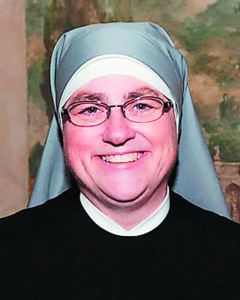
Sister Constance Veit
GUEST COLUMN
By Sister Constance Veit, LSP
Growing up, many of my family’s summer vacations took place at the ocean. Whenever we could afford it we would head for Cape Cod, New Hampshire or Maine. As we kids splashed around in the salt water or searched for shells, my mother loved to just sit and watch the waves crashing against the rocks. “I could stay here all day,” she’d often muse. We’d cringe at these words as we quickly grew bored and looked for the next great adventure!
But as I grew older and began to progress in a life of prayer, I came to understand my mother’s fascination with the sea. Whenever I visited the ocean I’d find a good spot where I could watch the waves crashing against the rocks or rolling across the sand, pull out my Bible or my rosary and reflect on the majesty and Providence of God.
This summer I found myself thinking about the sea for a special reason, for it was 150 years ago this September that seven Little Sisters of the Poor set off from our motherhouse in Brittany, France, on a long ocean journey. The Sisters traveled across the Atlantic in an immigrant ship named Napoleon III, arriving in Brooklyn, New York on Sept. 13, 1868. The massive iron vessel had been built in 1865 expressly for transatlantic travel, but the trip must have been harrowing just the same. An etching of the Napoleon III shows the ship being tossed about by waves during one of its voyages.
Beyond the normal anxieties associated with such an undertaking, the young Little Sisters on their way to New York surely entertained a host of other fears – for they were about to begin a new life and a new mission in a foreign country, with no expectation of ever returning to their homeland.
But this little band of Sisters had been formed in the school of Saint Jeanne Jugan, whose charity and trust in God’s loving Providence had led her to establish a new religious community despite a virtual lack of resources and preparation. Our pioneering Little Sisters surely rode out many a storm, leaning on their formation and trusting in the Lord whom even the winds and the waves obey (cf. Mt 8:27).
Despite their lack of proficiency in English and their ignorance of American culture, within two days of their arrival in New York the Sisters ventured out into the city to collect alms and procure all that would be necessary for the care of the elderly. Within a week they welcomed their first residents.
By the end of September a second group of Little Sisters destined for a foundation in Cincinnati had set out on the long journey to America. A third group arrived in New Orleans in December. In just four years the Little Sisters established 13 homes for the elderly in the United States; many more would follow. All were founded in extreme poverty but with great trust in God’s Providence.
Amazed at how completely God provided for their needs, the Sisters in one home wrote to the motherhouse, “Divine goodness never disappoints us in our expectations and often surpasses them.” Father Ernest Lelièvre, a French priest who served as the Congregation’s ambassador in America, encouraged the Sisters, “The Lord is with you; that says everything … Are you not his family, his people? Has not each of your homes had proof, a hundred times over, of his predilection? … Do not things happen every day which repeat to you: ‘You are in the house of the Lord, and it is here that he delights to dwell?’”
As we prepare to launch our sesquicentennial celebrations in our homes across the country, I find peace and confidence in remembering our story and thanking God for his Providence everyday and in every undertaking.
At the same time, I am conscious of how much the barque of the Church has been subjected to violent storms this summer and I confide to Our Lord those whose faith has been shaken in recent weeks. My prayer for all of us is that each day we may hear the voice of Jesus deep in our hearts as he calms our inner storms: “Take courage, it is I; do not be afraid.”
(Sister Constance Veit is director of communications for the Little Sisters of the Poor.)
Support for catechists greatly needed
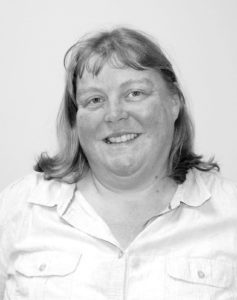
Fran Lavelle is the Director of Faith Formation for the Diocese of Jackson
KNEADING FAITH
By Fran Lavelle
The first days of September usher in so many good things and I’m not referring to Pumpkin Spice Lattes. College football has returned as a favorite pastime, cooler temperatures are right around the corner, and our young people are back in school. Life takes on a different cadence in the Fall. In the Church, we begin our religious education programs. Every year the U.S. Conference of Catholic Bishops discerns a theme for the catechetical year. This year the theme is, “Enlisting Witnesses for Jesus Christ.” At first glance, I was a bit put off by the theme as it sounded so jingoistic. However, after some thought I have come to appreciate the wisdom of the sentiment.
A deeper dig led me to come to understand what the bishops were thinking. This year’s catechetical theme is meant to address a growing population of Americans today known as the “nones.” The “nones” have no religious affiliation. Unfortunately, most “nones” once were affiliated with a church. American Evangelical preacher Francis Chan hits the nail on the head. He said, “We need to stop giving people excuses not to believe in God.” And by we, he means all of us. If our faith is to grow and thrive, the church needs all baptized Christians to accompany those who are on the peripheries, all who have been dismissed, all who have been injured in God’s name, and all who have been left without hope. It is a tall order. But, left undone our churches will quickly become historic landmarks of days and faith gone by.
The single best way to ensure the propagation of the faith is to give support to our catechists and formational leaders in our parishes. We have a responsibility to equip our catechists with both the competency and confidence to teach the faith. Catechesis is more than learning; catechesis engages the whole person both intellect and heart. One without the other fails to fully form. The National Directory for Catechesis (NDC) and the General Directory for Catechesis (GDC) identify the tasks of the catechetical ministry:
• To promote the knowledge of the faith.
• To promote a knowledge of the meaning of the Liturgy and Sacraments.
• To promote moral formation in Jesus Christ.
• To promote prayer and how to pray.
• To promote living in community and participating actively in the life and mission of the Church.
• To promote a missionary spirit that leads God’s people to be the living presence of Christ in society.
In 2016, the Diocese updated the Catechist Companion: A Curriculum Guide for Catechesis and Religious Education. GDC, NDC, and other appropriate catechetical materials, the Catechist Companion is divided by grade level. The major themes include: 1) the Trinity; 2) the centrality of Christ in the Church, Sacraments, and prayer life of the Christian; 3) the treatment of the theology of Church; 4) the Sacramental life of Christ; 5) the moral and social teachings of the Church; 6) the Church’s teaching on the dignity of human life and value of a chaste life. Each of these themes should be developed on an age appropriate level with the goal of bringing children into closer relationship with God to proclaim the Good News of Jesus Christ. Every catechist in our religious education programs should be familiar with the guidelines for curriculum for their grade level. The Catechist Companion is available online. To download a copy, visit our website: https://jacksondiocese.org/staff-resources/
A goal of the Department of Faith Formation is to provide a quality certification program to help develop both competency and confidence for our catechists. We knew it had to be flexible and enjoyable. To that end, I am thrilled to announce the availability of the new on-line catechist certification program. The program completed earlier in the spring has been tested by several catechists enrolled in the old on-line program. The new program has several features that I hope make it convenient for catechists to engage in the courses. The best feature is that the courses are free and can be taken at any time. We wanted to give the catechist flexibility in when they begin a course. The classes should take three weeks to complete and we are asking that the catechist take one course at a time. However, it is not problematic if a catechist needs a little extra time to complete a class. The learning management system that we developed creates learning communities. The program is available on-line at: https://jacksondiocese.faith/. I invite priests, LEMs, DREs and CREs to email me at fran.lavelle@jacksondiocese.org and we can set up a time to do a tutorial for your catechists. We are all enlisted to be witness for Jesus Christ. Our witness can accompany, our witness can catechize, our witness can transform. It is time to take up that mantel as competent and confident Catholic witnesses.
(Fran Lavelle is the director of the Department of Faith Formation for the Diocese of Jackson.)
